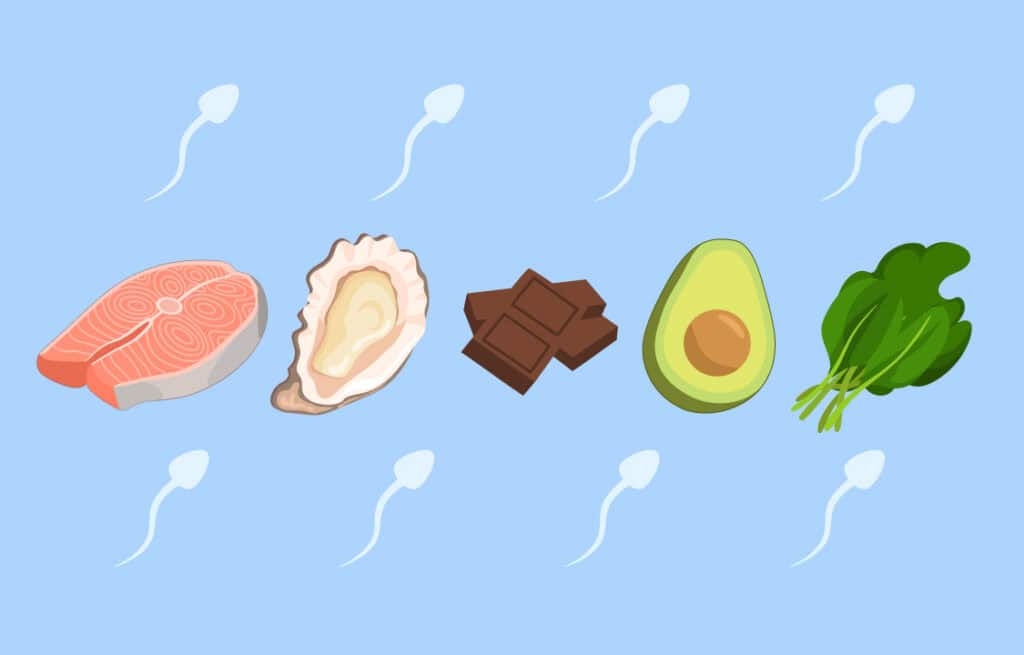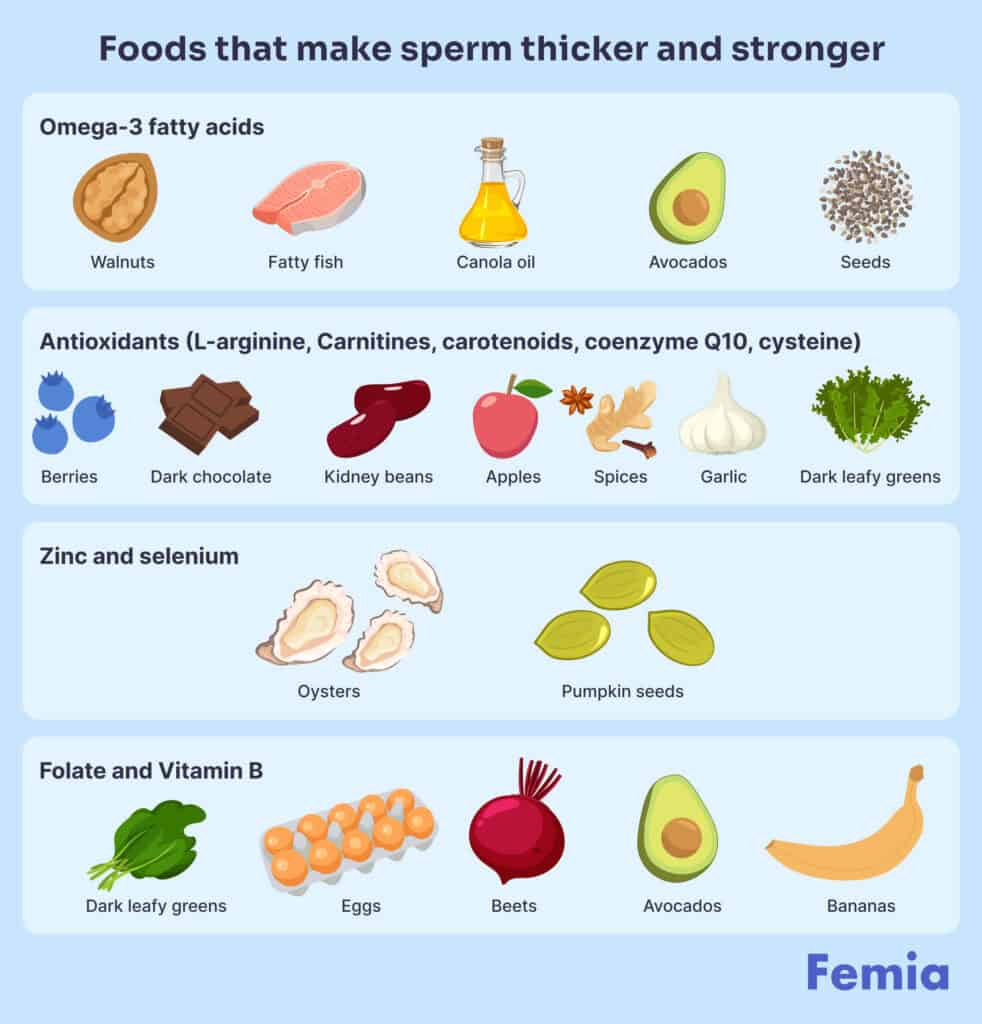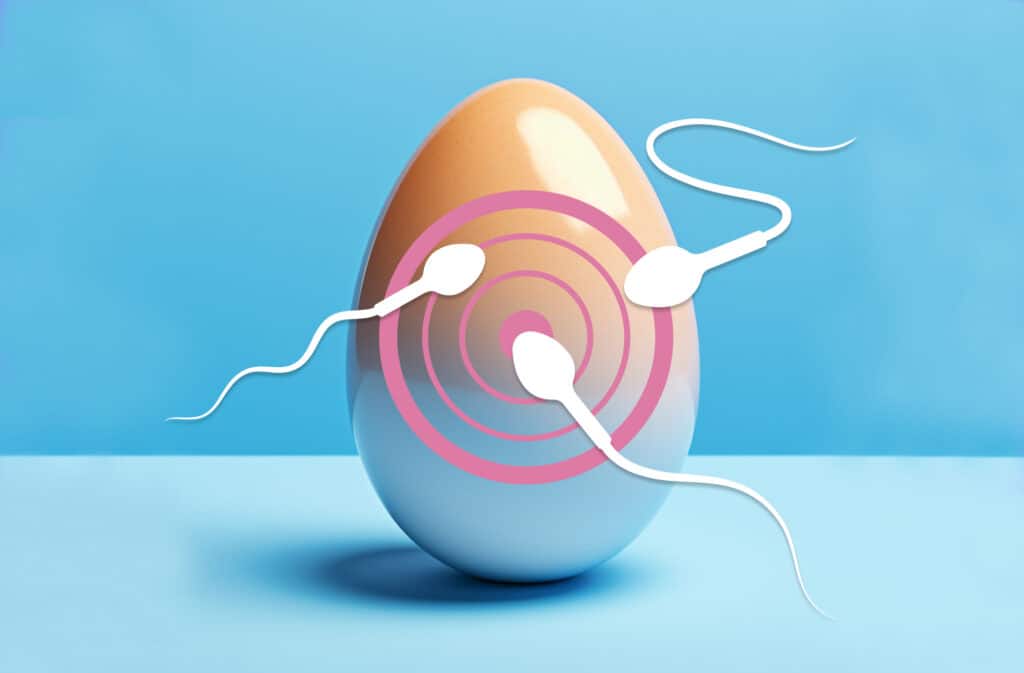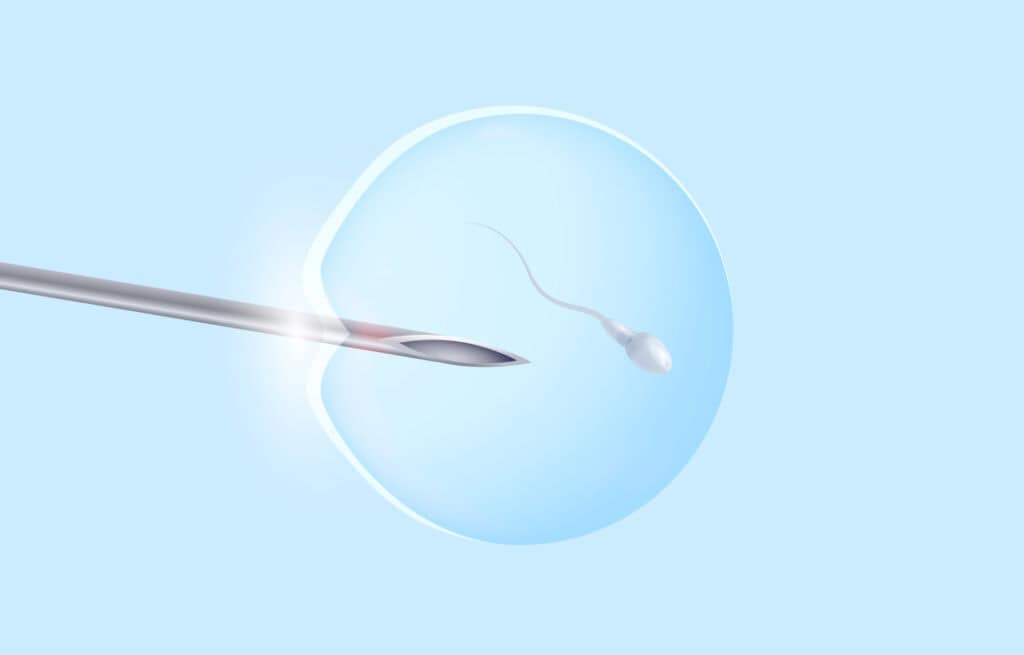Femia > Health Library > Getting Pregnant > Planning pregnancy > What foods produce sperm fast: Top sperm-boosting foods for better fertility
What foods produce sperm fast: Top sperm-boosting foods for better fertility

- Updated Feb 11, 2025
- Published
CRAFTED BY HUMAN
Crafted by human At Femia, we provide accurate and up-to-date information at every stage of your journey, from trying to conceive, pregnancy and postnatal support. All content is created by a real person based on in-depth research and own professional experience. Femia ensures that you will receive expert advice, strict accuracy and a personalized approach from our authors/medical experts. Learn more about our editorial policy.
FACT CHECKED
Fact checked At Femia Health, we maintain the highest standards of editorial excellence in delivering content focused on helping you conceive, guiding you through pregnancy, and supporting you postpartum. Explore our content review principles to learn how we ensure the accuracy and quality of our health and lifestyle tips for every stage of your journey.
- Eating a balanced diet full of antioxidants and omega-3 fatty acids can optimize sperm count and quality.
- Look to your leafy greens, nuts and seeds, fruits, and fatty fish for all the best sperm-boosting nutrients.
- Staying hydrated, exercising moderately and living a healthy lifestyle will also optimize sperm production and fertility.
Infertility is a common issue that around 15% of couples worldwide face, but it’s not just a women’s issue. In about half of infertile couples, the cause lies with the male partner.
Understanding why this happens and how men can protect their fertility are increasingly important conversations we need to have.
Many factors can impact male fertility including age, genetics, lifestyle, medications, disease, and diet. While you may not be able to change some of these factors, changing your diet to include sperm-boosting foods is one of the factors that you can take control of.
Femia helped 35,000 couples to optimize their fertility
Understanding sperm production and the factors affecting it
For the last 40 years, male fertility in the Western world has been dramatically declining. Researchers have been looking to see what role diet might play and if there are any foods that increase sperm count.
Semen is produced and released by the testes through a complex process involving hormones like testosterone. If anything disrupts this process it can affect sperm production and, in turn, fertility.
Sperm quality is measured using several factors that tell you how healthy your sperm is and how fertile you are:
- How much sperm is produced
- How well it moves (motility)
- The structure of the sperm
👉Find out more: How to get pregnant with poor sperm morphology?
The link between food and sperm
So, you might be wondering what is the connection between your diet and your sperm? Are there any foods that can boost sperm count?
Let’s start by noting that science doesn’t yet know everything about the link between food, lifestyle and fertility. But what we do know is this:
- Obesity and diabetes are linked to low testosterone levels and poor sperm quality. This is often caused by a poor diet.
- Some foods and nutrients are thought to protect against harmful inflammation, increase testosterone levels, boost sperm production, and improve sperm quality.
More research is needed but antioxidants may also play a role in sperm health.
Can you increase sperm volume overnight?
While you probably can’t significantly increase sperm volume overnight, there are some things that you can do to optimize your sperm health and volume as quickly as possible. Here are some practical tips to help you:
- Hydration:
- Stay hydrated. Semen is largely made up of water, so adequate hydration can help your body to optimize its sperm production. Aim for 8–10 glasses of water through the day and
- Minimize caffeine. Caffeine can dehydrate you and might even harm sperm.
2. Diet:
- A balanced diet. Eating a balanced fertility diet can help you to maintain a healthy weight and improve sperm quality.
- Nutrients. Certain nutrients like L—carnitine, zinc, selenium, coenzyme Q10 and omega-3 can improve sperm quality.
- Cut down. Just like some foods have been found to be beneficial to sperm, others have been found to be harmful. Cutting down on saturated fatty acids, processed meats and sugar-sweetened drinks can improve sperm quality.
3. Supplementation:
- Consider supplements. Some supplements have been found to help enhance sperm health. Before considering supplements, discuss with your healthcare provider if they are safe for you.
What foods help sperm production?
Eating a healthy, balanced diet is a key part of living a healthy life and maintaining a healthy weight. It also helps protect against diabetes and other harmful chronic diseases. Both obesity and diabetes can harm sperm and are risk factors for male infertility.
In addition to influencing your weight, certain foods can have a direct impact on sperm health:
- Antioxidants and omega-3 fatty acids protect sperm cells against oxidative stress and increase sperm production. Look below for a more detailed explanation of this.
Saturated fats, sugar, and trans fatty acids can reduce testosterone production and increase oxidative stress. This harms sperm cells, reduces the amount and quality of them, and may increase the risk of infertility.
Foods that make sperm thicker and stronger

To improve sperm thickness (volume of semen) and strength (sperm quality and motility), it’s essential to maintain a balanced intake of specific nutrients. Here is a lost of the key nutrients you need to quickly and effectively help you to boost your sperm health and what foods they’re found in:
| Nutrient | What foods is it found in? | Impact on sperm |
|---|---|---|
| Omega—3 fatty acids | • Walnuts
• Fatty fish (salmon, tuna, mackerel, sardines) • Seeds (flaxseed, chia seed) • Avocados • Canola oil | • Minimize oxidative stress
• Can increase sperm motility • Can increase sperm count • Can reduce abnormal sperm cells • Possible association between eating saturated fatty acids and quicker time to pregnancy |
| Antioxidants (L—arginine, Carnitines, carotenoids, coenzyme Q10, cysteine | • Berries
• Dark chocolate • Dark leafy greens • Kidney beans • Apples • Spices (ginger, cloves, turmeric) • Garlic | • Can improve sperm motility
• Can reduce abnormal sperm • Can increase sperm concentration • Can improve sperm count |
| Zinc and selenium | • Oysters
• Pumpkin seeds | • A potent antioxidant
• Plays a role in testes development • Essential for production of sperm • Can increase sperm quality |
| Folate and Vitamin B | • Dark leafy greens
• Eggs • Beets • Avocado • Bananas | • Helps reduce oxidative stress
• Can improve sperm quality |
A note on the Mediterranean diet:
A 2024 systematic scoping review examined various studies on the impact of diet on male fertility. It found that men who followed a Mediterranean diet had better semen quality and higher sperm counts. However, it’s unclear if this leads to improved fertility and higher pregnancy rates. More research is needed to confirm the benefits.
According to the Mayo Clinic, the Mediterranean diet, comes from countries bordering the Mediterranean Sea, there is no single definition but their traditional cuisine is a diet high in:
- vegetables
- fruits
- while grains
- beans
- nuts and seeds
- olive oil
- herbs and spices
Fish and poultry are eaten weekly but red meat is limited. Dairy is enjoyed in moderation but foods containing lots of added sugar are limited.
Supplements for boosting sperm
Supplements may play a role in boosting sperm quality, thickness, and count, especially when paired with a healthy lifestyle and diet. While a balanced diet usually provides most of the necessary nutrients, there are times when adding supplements can help increase your intake and support sperm health more effectively.
Here is a look into some of the supplements available and how they can boost your sperm:
- Zinc. Essential for the production of sperm and development of the testes. A deficiency can cause low sperm count, poor motility and damaged sperm.
- Folic acid. improve sperm quality by preventing DNA damage.
- Coenxyme Q10. Found in large quantities in the testes, it is thought to improve sperm motility. However, evidence is mixed as to whether it increases pregnancy rates.
- L-carnitine. L—Carnitine supplementation alongside micronutrients can significantly improve sperm count and quality and increase pregnancy rates, especially for men with a low sperm count.
- Vitamin C and E. These antioxidants help protect sperm from oxidative damage and may improve male fertility. However, studies have been small and inconsistent and rarely report the effect on pregnancy rates.
- Omega—3 fatty acids (fish oil). Can improve sperm quality and reduce damage from oxidative stress.
- Maca root. This root vegetable, native to the Andes, can be taken as a supplement. A small randomized control trial found that it may improve sperm quality in some men, but larger more rigorous studies are still needed.
While several studies have explored the impact of supplements on male fertility, the results are still unclear. More research is needed to determine their exact effect on fertility and pregnancy rates.
👉Find out more: Enhancing fertility naturally: A guide to fertility supplements and foods
Cautions for using supplements:
Consult a doctor
Before starting any supplement it is important that you first consult your healthcare provider. Just because you can purchase them without a prescription, does not mean they are safe. Supplements may interact with other medications or exacerbate certain medical conditions. For example, L-arginine should not be taken by people with heart conditions, kidney problems, asthma or certain allergies
Beware of the dose
Taking supplements in excessive amounts can cause adverse effects or potentially harm your fertility. Always seek advice from a professional before starting one.
Monitor for side effects
If you have any concerns or notice any side effects from a supplement, then the best thing to do is to stop taking it and seek advice from a healthcare professional.
Supplement quality
Not all supplements are created equally. It is important to choose high-quality supplements from reputable brands to best ensure they contain the right amount of active ingredients and are free from contaminants.
Lifestyle changes to enhance sperm count
There’s no overall one-size-fits-all approach to improving sperm count and quality. But there are certain things that every man can do to ensure his overall health and thus ensure that the health of his sperm is optimized.
- Don’t smoke.
- Eat a balanced diet.
- Regular moderate exercise.
- Cut down on alcohol.
- Limit heat to your testes.
- Reduce stress.
Sperm production takes about three months, so it may take a while to notice positive changes. The key is to make sure any healthy changes you adopt are sustainable over the long term. This will not only improve your sperm health but also enhance your overall well-being, helping you enter parenthood as your healthiest self.
Femia helped 35,000 couples to optimize their fertility
Questions from Femia community
Can dehydration affect sperm production?
Yes, staying hydrated is essential for maintaining healthy sperm volume and quality. Semen contains a large amount of water, so insufficient hydration can reduce semen volume and may lower overall sperm quality.
How long does it take for diet changes to impact sperm health?
Typically, it takes about 2-3 months for new sperm to develop, so any improvement from dietary changes needs at least this long to work. This is why it's important to sustain your lifestyle or dietary changes over the long term.
Do processed foods harm sperm count?
Yes, processed foods, high in unhealthy fats and sugars can negatively affect sperm count and overall fertility. Foods high in unhealthy fats and sugars can cause oxidative stress and are associated with having a raised body mass index (BMI). Both of these things can harm your sperm.
The bottom line
Eating a healthy, balanced diet is a key part of living a healthy life and is not only good for your overall well-being but can also optimize fertility and sperm production. Being consistent and making changes that are sustainable for the long term is key when it comes to boosting your sperm count.
Incorporating sperm-boosting foods rich in antioxidants and unsaturated fats into your diet can enhance sperm production and quality. Adding certain antioxidant supplements could also improve sperm count and mobility. However, it’s important to consult with your healthcare provider before starting any new supplements or medications to ensure they are appropriate for you.
References
- De Ligny, Wiep, et al. “Antioxidants for Male Subfertility.” Cochrane Library, vol. 2022, no. 5, May 2022, https://doi.org/10.1002/14651858.cd007411.pub5.
- Dimitriadis, Fotios, et al. “Antioxidant Supplementation on Male Fertility—A Systematic Review.” Antioxidants, vol. 12, no. 4, Mar. 2023, p. 836. https://doi.org/10.3390/antiox12040836.
- Ferramosca, Alessandra, and Vincenzo Zara. “Diet and Male Fertility: The Impact of Nutrients and Antioxidants on Sperm Energetic Metabolism.” International Journal of Molecular Sciences, vol. 23, no. 5, Feb. 2022, p. 2542. https://doi.org/10.3390/ijms23052542.
- “Healthy Sperm: Improving Your Fertility.” Mayo Clinic, 13 May 2022, www.mayoclinic.org/healthy-lifestyle/getting-pregnant/in-depth/fertility/art-20047584.
- “L-arginine.” Mayo Clinic, 10 Aug. 2023, www.mayoclinic.org/drugs-supplements-l-arginine/art-20364681#:~:text=L%2Darginine%20isn’t%20recommended,if%20you%20have%20these%20conditions.
- Levine, Hagai, et al. “Temporal Trends in Sperm Count: A Systematic Review and Meta-regression Analysis.” Human Reproduction Update, vol. 23, no. 6, June 2017, pp. 646–59. https://doi.org/10.1093/humupd/dmx022.
- Meccariello, Rosaria, et al. “Kisspeptins, New Local Modulators of Male Reproduction: A Comparative Overview.” General and Comparative Endocrinology, vol. 299, Sept. 2020, p. 113618. https://doi.org/10.1016/j.ygcen.2020.113618.
- “Mediterranean Diet for Heart Health.” Mayo Clinic, 15 July 2023, www.mayoclinic.org/healthy-lifestyle/nutrition-and-healthy-eating/in-depth/mediterranean-diet/art-20047801.
- Melnikovova, Ingrid, et al. “Effect ofLepidium meyeniiWalp. On Semen Parameters and Serum Hormone Levels in Healthy Adult Men: A Double-Blind, Randomized, Placebo-Controlled Pilot Study.” Evidence-based Complementary and Alternative Medicine, vol. 2015, Jan. 2015, pp. 1–6. https://doi.org/10.1155/2015/324369.
- Ricci, E., et al. “Dietary Habits and Semen Parameters: A Systematic Narrative Review.” Andrology, vol. 6, no. 1, Dec. 2017, pp. 104–16. https://doi.org/10.1111/andr.12452.
- Ricci, Elena, et al. “Coffee and Caffeine Intake and Male Infertility: A Systematic Review.” Nutrition Journal, vol. 16, no. 1, June 2017, https://doi.org/10.1186/s12937-017-0257-2.
- Santolaria, Pilar, et al. “Understanding Sperm Quality for Improved Reproductive Performance.” Biology, vol. 12, no. 7, July 2023, p. 980. https://doi.org/10.3390/biology12070980.
- Skoracka, Kinga, et al. “Diet and Nutritional Factors in Male (in)fertility—Underestimated Factors.” Journal of Clinical Medicine, vol. 9, no. 5, May 2020, p. 1400. https://doi.org/10.3390/jcm9051400.
- Tully, Cathryn A., et al. “Assessing the Influence of Preconception Diet on Male Fertility: A Systematic Scoping Review.” Human Reproduction Update, vol. 30, no. 3, Jan. 2024, pp. 243–61. https://doi.org/10.1093/humupd/dmad035.
- Zafar, Mohammad Ishraq, et al. “Effectiveness of Nutritional Therapies in Male Factor Infertility Treatment: A Systematic Review and Network Meta-analysis.” Drugs, vol. 83, no. 6, Mar. 2023, pp. 531–46. https://doi.org/10.1007/s40265-023-01853-0.
- Zhong, Ou, et al. “Association of Diabetes and Obesity With Sperm Parameters and Testosterone Levels: A Meta-analysis.” Diabetology & Metabolic Syndrome, vol. 13, no. 1, Oct. 2021, https://doi.org/10.1186/s13098-021-00728-2.

Discover how to improve egg quality with 9 expert tips. Learn signs of good egg quality and strategies to increase fertility, even after 35. Femia’s guide to optimal reproductive health.

Discover if period sex causes attachment or makes you more bonded to your partner. Learn about spiritual aspects and effects on men. Expert insights on period sex from Femia.

How long does IVF take from the first appointment to a successful pregnancy? Read a complete guide to the IVF process and timeline to learn what to expect.

